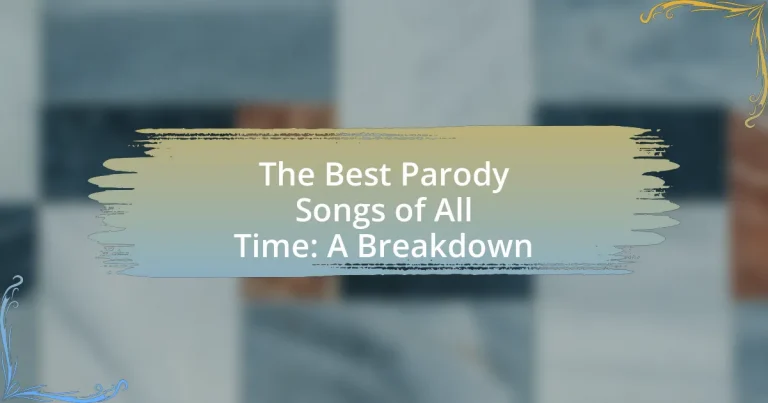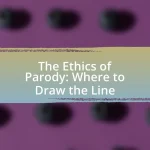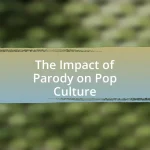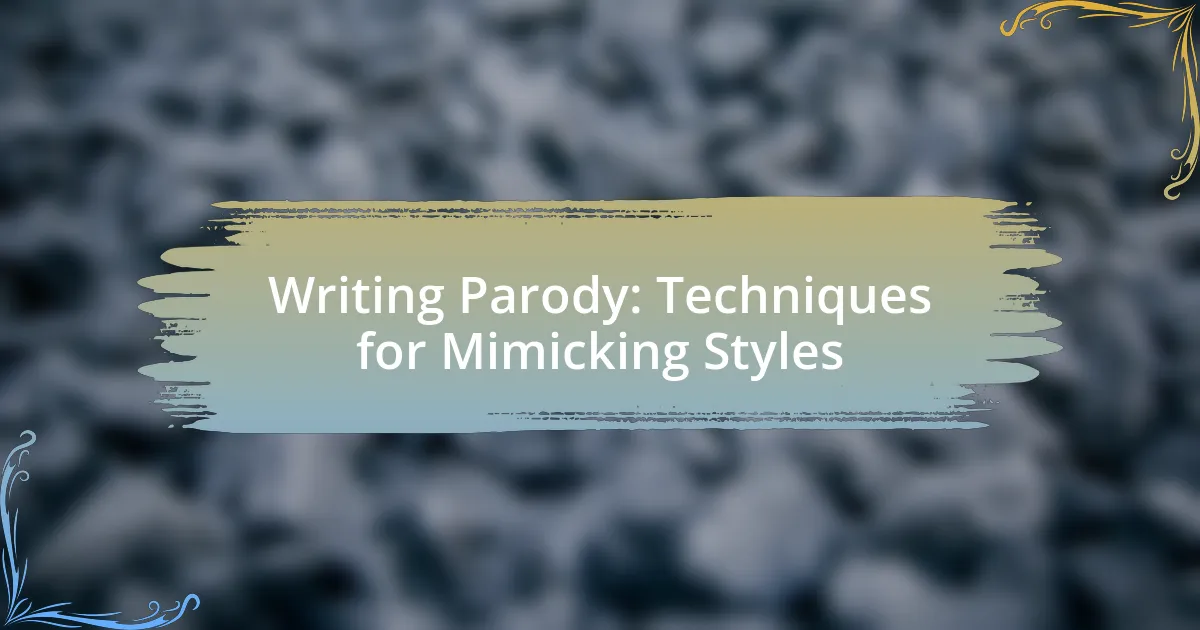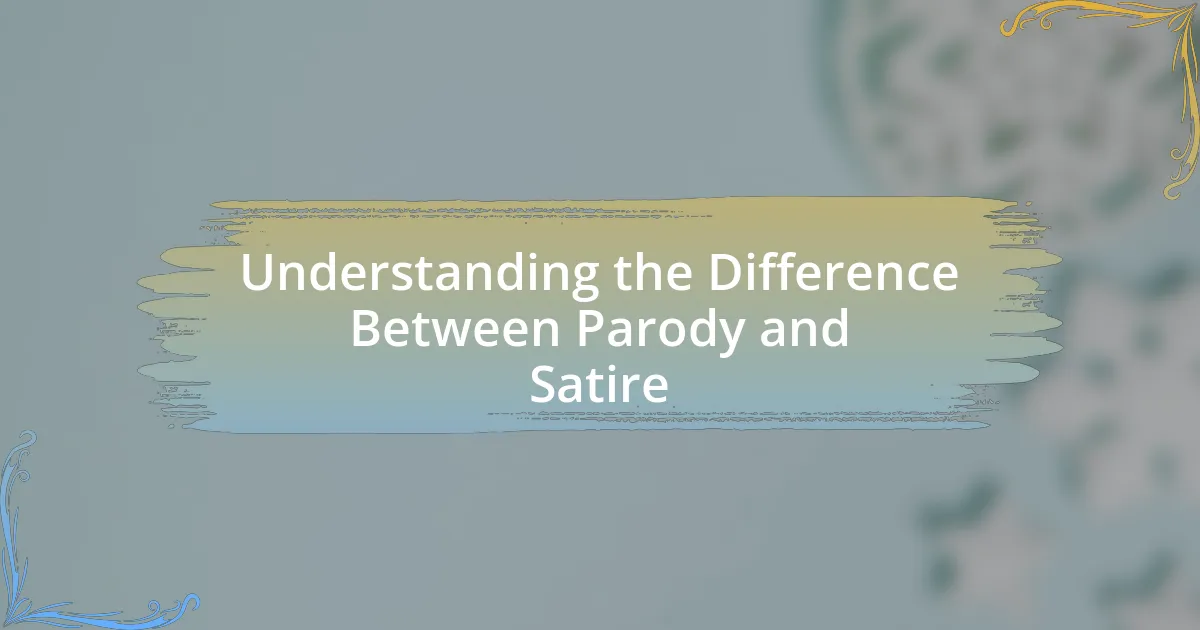Parody songs are humorous reinterpretations of existing music, often altering lyrics to provide social commentary and critique cultural norms. This article explores the significance of parody songs, highlighting their role in reflecting societal issues and influencing popular culture. It examines notable parody artists, particularly “Weird Al” Yankovic, and discusses the evolution of parody music over time, including trends in technology and distribution. Additionally, the article identifies the best parody songs of all time, defining criteria for their success and impact within the music industry.
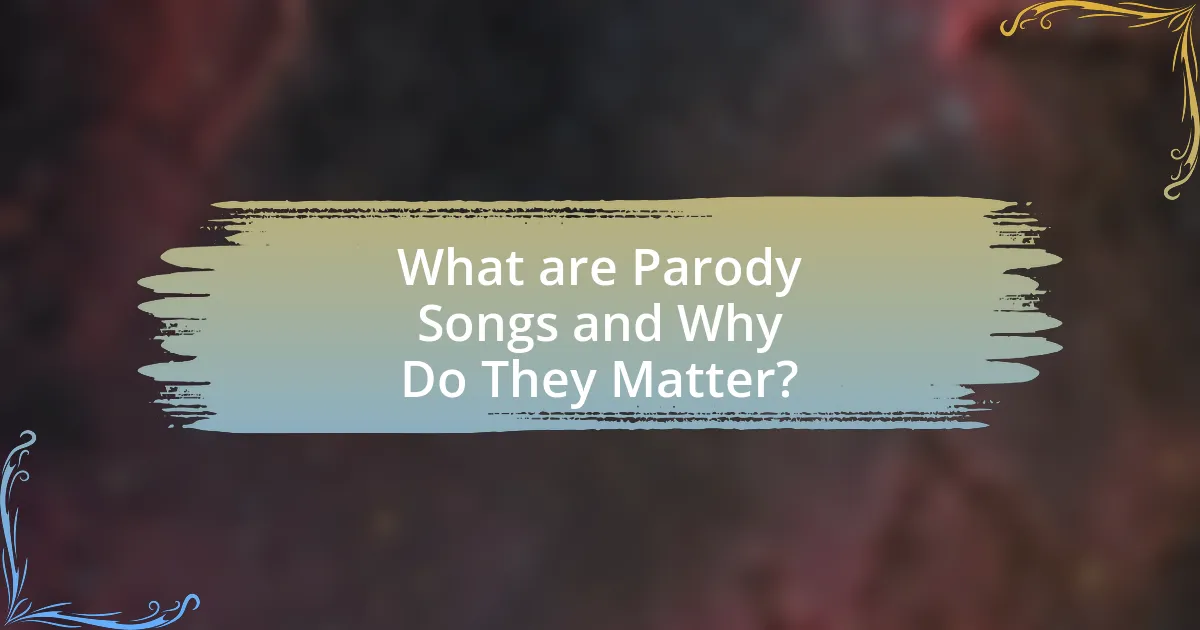
What are Parody Songs and Why Do They Matter?
Parody songs are humorous or satirical reinterpretations of existing songs, often altering the lyrics to create comedic effect while maintaining the original melody. They matter because they serve as a form of social commentary, allowing artists to critique cultural norms, politics, or societal issues through humor. For example, “Weird Al” Yankovic is renowned for his parody songs, which not only entertain but also provoke thought on various subjects, demonstrating the power of music as a medium for satire and reflection.
How do parody songs differ from traditional songs?
Parody songs differ from traditional songs primarily in their purpose and content, as parody songs aim to humorously imitate or comment on existing songs, often altering lyrics to create satire or social commentary. Traditional songs typically focus on original themes, emotions, or narratives without the intent of parody. For example, “Weird Al” Yankovic’s parodies transform popular songs into humorous takes on contemporary issues, showcasing how parody can serve as a critique or playful homage to the original work. This distinction highlights the unique role of parody in music as a form of artistic expression that engages with and reflects on cultural phenomena.
What elements make a song a parody?
A song is considered a parody when it humorously imitates the style or content of another song, often altering the lyrics to create a comedic effect. Key elements that define a parody include a recognizable melody from the original song, altered lyrics that typically comment on or satirize the subject matter of the original, and a humorous or exaggerated tone that distinguishes it from the original work. For example, “Weird Al” Yankovic is known for his parodies that maintain the musical structure of the original while providing a humorous twist, effectively demonstrating the elements of parody through his work.
Why do artists choose to create parody songs?
Artists choose to create parody songs primarily to provide social commentary and humor. By mimicking popular songs, artists can critique cultural norms, political issues, or societal behaviors in an entertaining way. For instance, “Weird Al” Yankovic is renowned for his parodies that often highlight absurdities in contemporary culture, making complex topics more accessible and engaging for audiences. This approach not only entertains but also invites listeners to reflect on the original material, demonstrating the effectiveness of parody as a tool for both amusement and critique.
What cultural significance do parody songs hold?
Parody songs hold significant cultural importance as they serve as a form of social commentary and critique, often reflecting societal norms, political issues, or popular culture. By using humor and satire, parody songs can challenge the status quo, provoke thought, and encourage discussions about various topics. For instance, “Weird Al” Yankovic’s parodies often highlight absurdities in contemporary life and music, making complex issues more accessible to a broader audience. This ability to engage listeners while entertaining them underscores the role of parody songs in shaping cultural narratives and influencing public opinion.
How do parody songs reflect societal issues?
Parody songs reflect societal issues by using humor and satire to critique cultural norms, political events, and social behaviors. For instance, “Weird Al” Yankovic’s “Amish Paradise” addresses stereotypes and misconceptions about the Amish community, highlighting broader themes of cultural misunderstanding. Additionally, the song “American Idiot” by Green Day critiques American politics and media, resonating with public discontent during the early 2000s. These examples demonstrate how parody songs serve as a mirror to society, provoking thought and discussion on relevant issues through accessible and entertaining formats.
In what ways do parody songs influence popular culture?
Parody songs influence popular culture by providing social commentary, shaping public opinion, and creating shared cultural experiences. These songs often satirize current events, celebrities, or societal norms, making complex issues more accessible and engaging for audiences. For instance, “Weird Al” Yankovic’s parodies have not only entertained but also sparked discussions about the original songs and their themes, demonstrating how humor can facilitate critical thinking. Additionally, parody songs often go viral, amplifying their reach and impact, as seen with “Gangnam Style” parodies that contributed to the global phenomenon of K-pop. This viral nature helps to solidify the cultural relevance of both the parody and the original work, influencing trends and consumer behavior in music and beyond.

Who are the Most Notable Parody Artists?
The most notable parody artists include “Weird Al” Yankovic, The Lonely Island, and Flight of the Conchords. “Weird Al” Yankovic is renowned for his humorous songs that parody popular music, with hits like “Eat It” and “Amish Paradise,” which have earned him multiple Grammy Awards. The Lonely Island, known for their digital shorts on Saturday Night Live, created viral hits such as “I’m on a Boat” and “Dick in a Box,” showcasing their unique blend of comedy and music. Flight of the Conchords, a New Zealand duo, gained fame for their witty songs and television series, producing memorable tracks like “Business Time” and “Hurt Feelings.” These artists have significantly influenced the parody genre, contributing to its popularity and evolution in contemporary music.
What contributions have artists like “Weird Al” Yankovic made to parody music?
Artists like “Weird Al” Yankovic have significantly shaped parody music by blending humor with popular culture, creating a unique genre that critiques and celebrates contemporary music. Yankovic’s meticulous parodies, such as “Eat It” and “Amish Paradise,” not only mimic the original songs but also provide social commentary, making them relevant and engaging. His work has garnered multiple Grammy Awards, highlighting the artistic merit of parody music. Additionally, Yankovic’s ability to adapt his style to various musical genres has expanded the reach and appeal of parody, influencing countless artists and solidifying his status as a pioneer in the field.
What are some of “Weird Al” Yankovic’s most famous works?
“Weird Al” Yankovic’s most famous works include “Eat It,” a parody of Michael Jackson’s “Beat It,” and “Like a Surgeon,” which parodies Madonna’s “Like a Virgin.” Additionally, “Amish Paradise,” a take on Coolio’s “Gangsta’s Paradise,” and “White & Nerdy,” which parodies Chamillionaire’s “Ridin’,” are also among his well-known songs. These tracks have achieved significant commercial success and critical acclaim, contributing to Yankovic’s reputation as a leading figure in musical parody.
How has “Weird Al” influenced other parody artists?
“Weird Al” Yankovic has significantly influenced other parody artists by setting a high standard for musical creativity and humor in parody. His meticulous approach to crafting parodies, which often includes clever wordplay and cultural commentary, has inspired artists like The Lonely Island and Flight of the Conchords. For instance, “Weird Al” has won multiple Grammy Awards, including Best Comedy Album, showcasing his impact on the genre and encouraging others to pursue parody with a similar level of professionalism. Additionally, his ability to blend satire with catchy melodies has paved the way for contemporary parody artists to gain mainstream recognition, demonstrating that humor in music can achieve commercial success.
Which other artists are known for their parody songs?
Weird Al Yankovic is the most prominent artist known for his parody songs. He has released numerous albums featuring parodies of popular songs, such as “Eat It,” a parody of Michael Jackson’s “Beat It,” and “Amish Paradise,” which parodies Coolio’s “Gangsta’s Paradise.” Other artists recognized for their parody work include The Lonely Island, known for comedic songs like “I’m on a Boat,” and Flight of the Conchords, who gained fame with tracks like “Business Time.” These artists have successfully blended humor with music, contributing significantly to the genre of parody songs.
What styles do these artists bring to their parodies?
Artists bring a variety of styles to their parodies, including satire, humor, and musical mimicry. For instance, “Weird Al” Yankovic is known for his clever wordplay and genre-specific adaptations, transforming popular songs into humorous takes that often critique societal norms. Similarly, the group The Lonely Island employs a comedic style that blends absurdity with catchy hooks, creating parodies that often comment on contemporary culture. These styles are effective because they resonate with audiences through relatable humor and sharp social commentary, making the parodies both entertaining and thought-provoking.
How do these artists’ backgrounds influence their parody work?
Artists’ backgrounds significantly influence their parody work by shaping their perspectives, cultural references, and comedic styles. For instance, an artist’s upbringing in a specific cultural or socio-economic environment can inform the themes and subjects they choose to satirize, allowing them to connect with audiences who share similar experiences or viewpoints. Additionally, artists with diverse backgrounds may incorporate a wider range of cultural references, enhancing the depth and relatability of their parodies. Historical context also plays a role; artists who have lived through significant social or political events often draw upon these experiences to critique contemporary issues through humor. This interplay between background and parody is evident in the works of artists like “Weird Al” Yankovic, whose parodies often reflect his experiences growing up in a suburban environment, or The Lonely Island, whose comedic style is influenced by their backgrounds in sketch comedy and digital media.
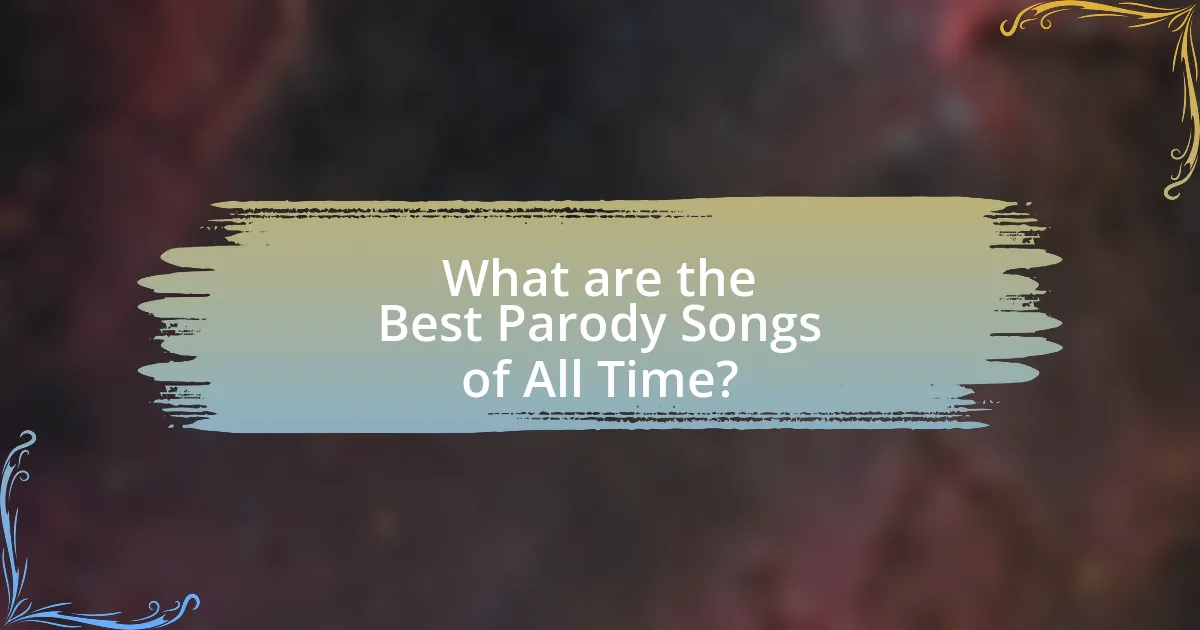
What are the Best Parody Songs of All Time?
The best parody songs of all time include “Weird Al” Yankovic’s “Amish Paradise,” which humorously reinterprets Coolio’s “Gangsta’s Paradise,” and “Eat It,” a parody of Michael Jackson’s “Beat It.” These songs are widely recognized for their clever lyrics and cultural commentary, contributing to their lasting popularity. “Amish Paradise” reached number 53 on the Billboard Hot 100, showcasing its commercial success, while “Eat It” peaked at number 12, further solidifying Yankovic’s status as a leading figure in musical parody. Other notable mentions are “I Want a New Duck” and “Like a Surgeon,” both of which exemplify the art of parody through witty wordplay and satire.
What criteria define the best parody songs?
The best parody songs are defined by their cleverness, humor, and cultural relevance. Cleverness involves the ability to creatively reinterpret the original song’s lyrics while maintaining a coherent narrative that resonates with listeners. Humor is essential, as it engages the audience through wit, satire, or absurdity, often highlighting societal issues or pop culture phenomena. Cultural relevance ensures that the parody connects with current events or trends, making it relatable and timely. For example, “Weird Al” Yankovic’s parodies often exemplify these criteria, as seen in his song “Amish Paradise,” which humorously critiques lifestyle choices while cleverly mirroring the original song’s structure and melody.
How do popularity and cultural impact factor into this definition?
Popularity and cultural impact are essential in defining the best parody songs, as they determine the songs’ resonance and relevance within society. Popularity reflects how widely a parody song is recognized and enjoyed, often measured by chart performance, streaming numbers, and social media engagement. For instance, “Weird Al” Yankovic’s parodies have consistently topped charts and garnered millions of views, illustrating their widespread appeal. Cultural impact signifies how a parody song influences or comments on societal issues, trends, or other media, often sparking conversations or shaping public perception. An example is “Amish Paradise,” which not only parodied Coolio’s “Gangsta’s Paradise” but also addressed cultural stereotypes, thus leaving a lasting impression on both music and society.
What role does humor play in the effectiveness of a parody song?
Humor is essential to the effectiveness of a parody song as it engages the audience and enhances the comedic critique of the original work. By using wit and satire, parody songs can highlight absurdities or flaws in the source material, making the commentary more relatable and entertaining. For instance, “Weird Al” Yankovic’s parodies often employ clever wordplay and humorous scenarios that resonate with listeners, thereby increasing the song’s appeal and memorability. This comedic approach not only entertains but also encourages listeners to reflect on the original content, reinforcing the parody’s message.
What are some examples of iconic parody songs?
Some examples of iconic parody songs include “Weird Al” Yankovic’s “Eat It,” which parodies Michael Jackson’s “Beat It,” and “Amish Paradise,” a take on Coolio’s “Gangsta’s Paradise.” Additionally, “I Lost on Jeopardy,” another “Weird Al” creation, parodies Greg Kihn’s “Jeopardy.” These songs are recognized for their clever lyrics and humorous twists on popular hits, contributing to their status as iconic parodies in music history.
What makes “Amish Paradise” a standout parody?
“Amish Paradise” is a standout parody due to its clever juxtaposition of traditional Amish life with the themes of Coolio’s original song “Gangsta’s Paradise.” The parody effectively uses humor and irony to highlight the stark contrast between the peaceful, simple lifestyle of the Amish and the struggles depicted in the original rap, making it relatable and entertaining. Additionally, “Amish Paradise” features catchy lyrics and a memorable melody, which contribute to its popularity and enduring appeal. The song’s success is further evidenced by its chart performance, reaching number 53 on the Billboard Hot 100 and receiving significant airplay, solidifying its status as one of the most recognized parody songs in music history.
How did “Gangsta’s Paradise” influence the reception of its parody?
“Gangsta’s Paradise” significantly influenced the reception of its parody by establishing a strong cultural and emotional resonance that the parody could leverage. The original song, released in 1995, addressed serious themes such as crime and existential despair, which garnered widespread acclaim and recognition, including a Grammy Award. This depth allowed the parody to attract attention by contrasting the serious tone with humor, thereby enhancing its appeal. The parody’s reception was further bolstered by the original’s popularity, as audiences were already familiar with the source material, making the parody more relatable and engaging.
How have parody songs evolved over time?
Parody songs have evolved significantly from their origins in the early 20th century to the present day. Initially, parody songs were simple comedic reinterpretations of popular tunes, often performed in vaudeville and music halls, with artists like Allan Sherman popularizing the format in the 1960s through humorous lyrics set to well-known melodies.
As technology advanced, particularly with the rise of the internet and social media, parody songs became more accessible and widespread. Platforms like YouTube allowed creators to produce and share their work rapidly, leading to viral sensations such as “Weird Al” Yankovic’s elaborate music video parodies, which often included original compositions and intricate production values.
The evolution also reflects cultural shifts, as parody songs now often address contemporary social issues, politics, and pop culture phenomena, demonstrating their adaptability and relevance. For example, the “Gangnam Style” parody trend showcased how global hits could be humorously reinterpreted across diverse cultures.
Overall, parody songs have transitioned from stage performances to digital platforms, becoming a significant part of modern entertainment and commentary.
What trends have emerged in parody music in recent years?
Recent years have seen a rise in the use of social media platforms for the distribution of parody music, significantly impacting its reach and popularity. Artists like Weird Al Yankovic and newer creators have leveraged platforms such as TikTok and YouTube to share their work, allowing for rapid dissemination and audience engagement. This trend is supported by the fact that viral challenges and memes often incorporate parody songs, making them more accessible and relatable to younger audiences. Additionally, the blending of genres in parody music has become more pronounced, with artists incorporating elements from various musical styles to enhance humor and appeal, reflecting broader musical trends.
How has technology impacted the creation and distribution of parody songs?
Technology has significantly transformed the creation and distribution of parody songs by enabling easier access to production tools and wider platforms for sharing. Digital audio workstations (DAWs) and software like GarageBand or Audacity allow creators to produce high-quality parody songs without the need for expensive studio time. Additionally, platforms such as YouTube, TikTok, and social media facilitate rapid distribution, allowing parody songs to reach global audiences instantly. For instance, the viral success of “Weird Al” Yankovic’s parodies has been amplified by the internet, showcasing how technology can enhance visibility and engagement. This shift has democratized the parody genre, allowing more creators to participate and share their work with minimal barriers.
What tips can aspiring parody artists follow to succeed?
Aspiring parody artists can succeed by honing their comedic timing and understanding the original material they are parodying. Mastering comedic timing allows artists to deliver punchlines effectively, while a deep understanding of the source material ensures that the parody resonates with the audience. Successful parody artists often analyze popular songs or cultural references, identifying key themes and elements to exaggerate or twist for comedic effect. For instance, “Weird Al” Yankovic, a renowned parody artist, meticulously studies the original songs to create clever and humorous lyrics that maintain the essence of the original while providing a fresh perspective. This approach not only entertains but also engages audiences who appreciate the cleverness of the parody.
How can one effectively choose a song to parody?
To effectively choose a song to parody, one should select a song that is widely recognized and has relatable themes. Popularity ensures that the audience will be familiar with the original song, making the parody more impactful. For instance, songs that have charted highly or are frequently played in media are ideal candidates. Additionally, the song’s lyrics should lend themselves to humor or satire, allowing for clever wordplay or commentary. A successful example is “Weird Al” Yankovic’s parodies, which often target contemporary hits, demonstrating that familiarity and thematic relevance enhance the parody’s effectiveness.
What are best practices for writing humorous lyrics in a parody?
Best practices for writing humorous lyrics in a parody include maintaining a clear connection to the original song while introducing clever twists and wordplay. This approach ensures that the humor resonates with the audience by leveraging familiar melodies and themes. Additionally, using exaggeration and absurdity can enhance comedic effect, as seen in successful parodies like “Weird Al” Yankovic’s works, which often amplify the quirks of the original material. Incorporating topical references or cultural commentary can also make the parody more relatable and timely, further engaging listeners.
